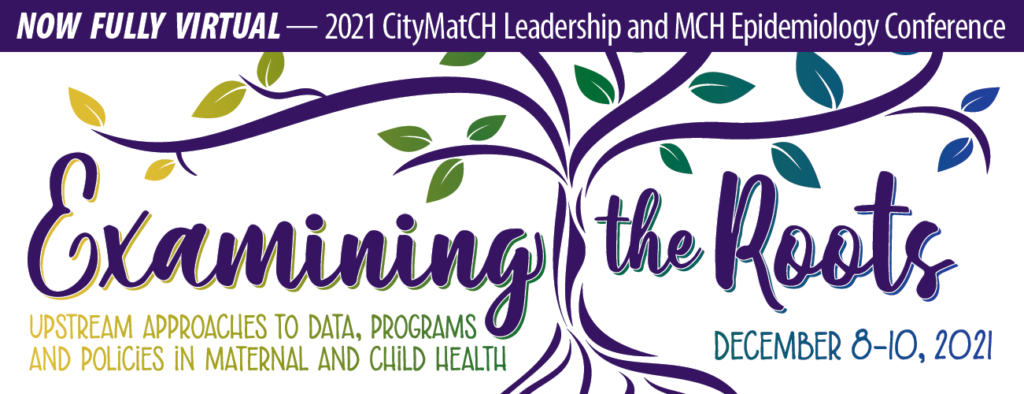Reflections on the 2021 CityMatCH Leadership and MCH Epidemiology Conference
.

Throughout the week of December 6th, I attended the CityMatCH Leadership and MCH Epidemiology Conference. The week was centered around the theme: “Examining the Roots: Upstream Approaches to Data, Programs and Policies in Maternal and Child Health.” As an MCH Epidemiology student in the Community Health Sciences division, I was eager to identify the ways my new skills and knowledge could be applied within the field of MCH research and practice. I was able to meet experts and explore the current intersection of community work and the role of data collection, analysis, and presentation thanks to the support of the CoE-MCH Travel Grant.
The presentations were split into several types: live plenary presentations, skill-building workshops, “on-demand” abstract sessions, and poster presentations. There were even fun activities like a DJ Dance Hall and Networking Session. Because it was during finals weeks, and there were about two hundred presentations, one of the aspects I appreciated most about the conference is that I could watch recordings of the sessions post-conference week. Over Winter Break, I downloaded the conference app, created a wishlist of presentations, and slowly engaged with the incredibly impressive conversations.
As a Black woman, I felt seen; the conference demonstrated its commitment to decolonizing data and taking an anti-racist approach to MCH research and practice. It was evident in the land acknowledgments, the research topics, and the speakers themselves as well as the way they made sure to report health inequities in the work they were doing/needed. The keynote speaker Abigail Echo-Hawk was a phenomenal speaker and epidemiologist. She reminded us to thoughtfully consider our responsibility after sharing land acknowledgements and highlighted the consequences of underreporting and erasing American Indians/Alaska Natives and multi-race populations from data. I leave her better understanding the importance of studying small population epidemiology and supporting indigenous populations in my public health career.
A few notes about my favorite presentations….
First of all, I loved that there was a wealth of information on breastfeeding! Felisha Floyd, Black Lactation Activist, aka “Blactavist,” presented on “Reclaiming Black Breastfeeding.” This was a skills building session, where I learned about the ways unresolved historical and intergenerational trauma impacted child care, breastfeeding, and lactation support. Our speaker also cast a vision for a better future and provided skills, tools, and questions for us as health practitioners to address institutional and individual bias.
My second favorite part – although I did not present, I felt so proud to attend a session representing UIC SPH’s very own poster presentation, “Elevating Men’s Voices in MCH Settings.” The poster was developed by Drs. Brenikki Floyd, Virginia Reising, and Arden Handler along with current and former MCH students Abby Holicky (MCH PhD Candidate) and Kate Yep (MCHEPI MPH ‘21). It shed light on the health challenges and needs of fathers and the barriers they face to being involved in their children’s health. I really appreciated that the importance of men in families and MCH was highlighted during the conference.
Third and finally, CityMatCH introduced me to a wealth of new skills. The pre-conference session “Introduction to Data Visualization” with Dr. Michael Kramer was one of my favorite presentations. He broke data visualization into 5 steps: epidemiology (step 0), followed by the “why” (step 1), data type (step 2), “the how”/what works (step 3), and design guidelines (step 4). We went through each of the steps in an interactive way, allowing us to use examples and decide the best end products. I consumed as much as I could that week and saved the rest of the resources for future reference. This session finally gave me a way to articulate the side of epidemiology that I was most excited about – presenting the qualitative and quantitative data in a visual, equitable, and meaningful way. As I am applying to APEs now, I am looking for opportunities to develop this skill.
A large part of my experience was virtual. Although I had to miss some sessions due to finals week exams, I have since watched many of my “wishlist” sessions and connected with many students and professionals via Twitter and LinkedIn (highly recommend networking on these platforms). With my interests in MCHEPI and community health sciences, I was happy to hear from experts who are rooted in both approaches, emphasizing that “the community has the answer” to our data questions. In September, the next CityMatCH conference will be hosted live in Chicago, and I hope to present and also participate on the conference committee. If you are interested in any of the presentations I have described, feel free to explore the YouTube channel of CityMatCH UNMC – https://youtube.com/playlist?list=PLQhNudMhsp-HH73u1mWvW35w47afUGwzT.